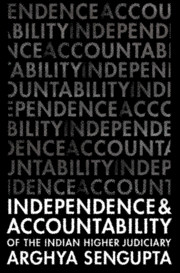Book contents
- Frontmatter
- Dedication
- Contents
- Acknowledgements
- List of Abbreviations
- List of Cases
- List of Statutes
- 1 Introduction
- PART I THE INDIAN EXPERIENCE
- PART II A CONCEPTUAL ANALYSIS
- PART III TYING THE STRANDS
- 8 Harmonising Judicial Independence and Judicial Accountability in India
- 9 Conclusion: A Reform Proposal for the Indian Higher Judiciary
- Epilogue: The Moment the Judiciary Came Out
- Appendix Post-Retirement Employment of Judges in Government-Appointed Positions
- Bibliography
- Index
9 - Conclusion: A Reform Proposal for the Indian Higher Judiciary
from PART III - TYING THE STRANDS
Published online by Cambridge University Press: 26 April 2019
- Frontmatter
- Dedication
- Contents
- Acknowledgements
- List of Abbreviations
- List of Cases
- List of Statutes
- 1 Introduction
- PART I THE INDIAN EXPERIENCE
- PART II A CONCEPTUAL ANALYSIS
- PART III TYING THE STRANDS
- 8 Harmonising Judicial Independence and Judicial Accountability in India
- 9 Conclusion: A Reform Proposal for the Indian Higher Judiciary
- Epilogue: The Moment the Judiciary Came Out
- Appendix Post-Retirement Employment of Judges in Government-Appointed Positions
- Bibliography
- Index
Summary
A book critiquing systems of appointments, transfers, impeachment and post-retirement employment provisions and practices in the Indian higher judiciary through the lens of judicial independence and accountability would be incomplete without offering viable alternatives. Limiting oneself solely to criticisms of such provisions might have considerable intrinsic value; however, absent specific proposals for reform, such criticisms will always be vulnerable to the charge of being unconstructive. This is not meant to belittle description, analysis and critique per se —in fact, without these, reforms can scarcely be successful. But a proposal for law reform is the next logical step, and on the basis of the materials analysed and the practices surveyed, this book is in a position to take this step, offering an overview of what reform in these areas might look like.
The suggested reforms in this section are more in the nature of a detailed overview rather than a comprehensive account. This is deliberate, for two reasons. First, to offer a detailed solution requires a close look at comparative systems in other common law jurisdictions as well as countries in South Asia which share similar legal histories and societal contexts. This is a different project, one that cannot be undertaken here. Second, judicial independence and accountability provide one set of parameters amongst many, which ought to be kept in mind while reforming systems pertaining to the judiciary. Appointment reform needs to factor in diversity, subject matter competence; transfers have to account for administrative convenience; impeachment must take into account the high status of the judiciary; and post-retirement employment must be sensitive to a socio-political context where apolitical judges are seen as ideal candidates for significant quasi-judicial positions. Such a multi-dimensional reform proposal is beyond the remit of this book. Thus the reform proposal advanced herein must necessarily be viewed as limited and focused on two issues—first, devising systems that lead to an effective judiciary, drawing an optimal balance between judicial independence and accountability; second, doing so in a manner that is constitutional, as a matter of positive law. Accordingly, this chapter approaches each of the four topics—appointments, transfers, impeachment and post-retirement employment—from the perspective of the two aforementioned issues. It gleans both why the position of law is unsatisfactory from the substantive Chapters 2, 3 and 4 and the results of the doctrinal enquiry in Chapter 8.
- Type
- Chapter
- Information
- Independence and Accountability of the Higher Indian Judiciary , pp. 235 - 263Publisher: Cambridge University PressPrint publication year: 2019



